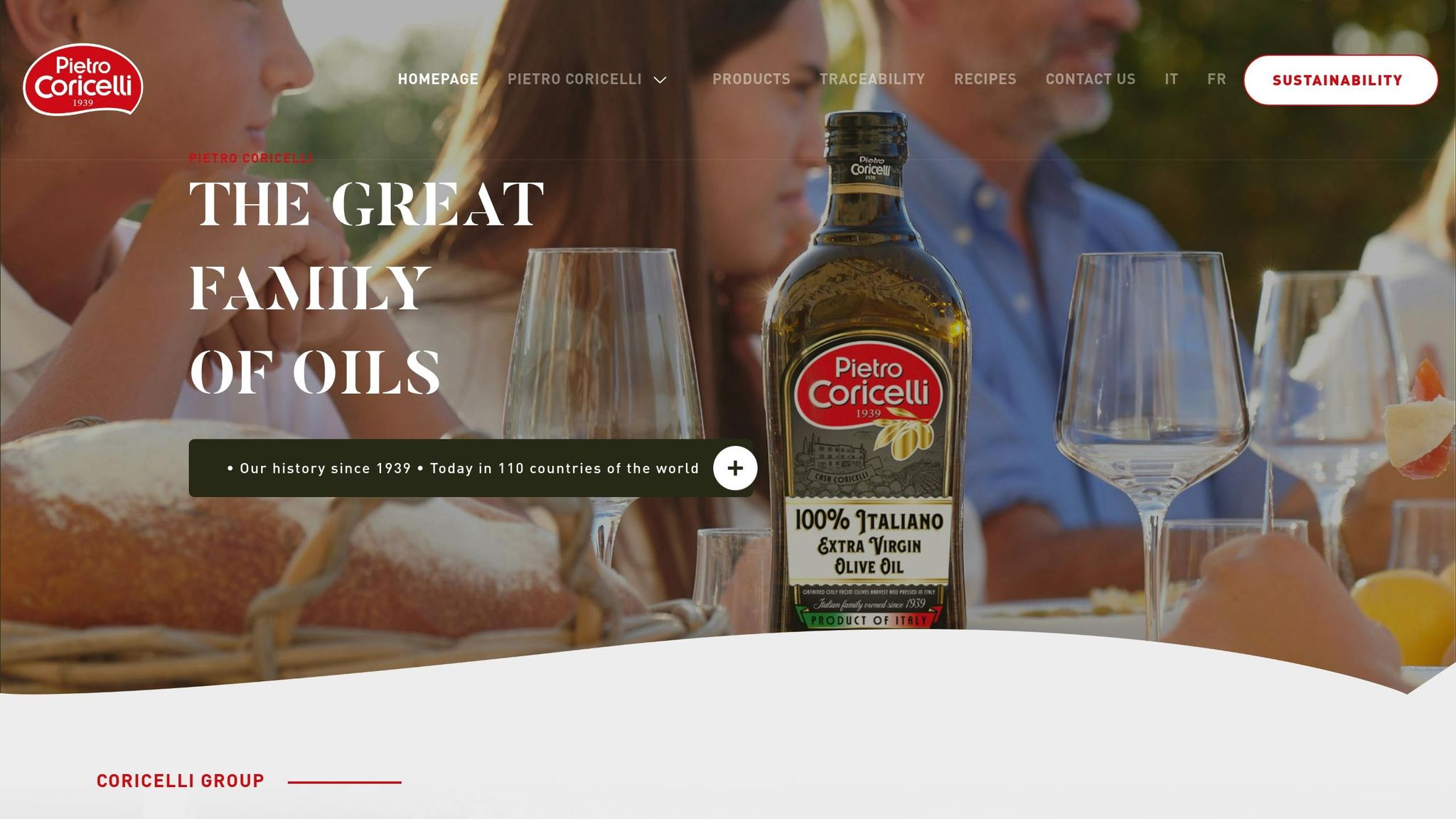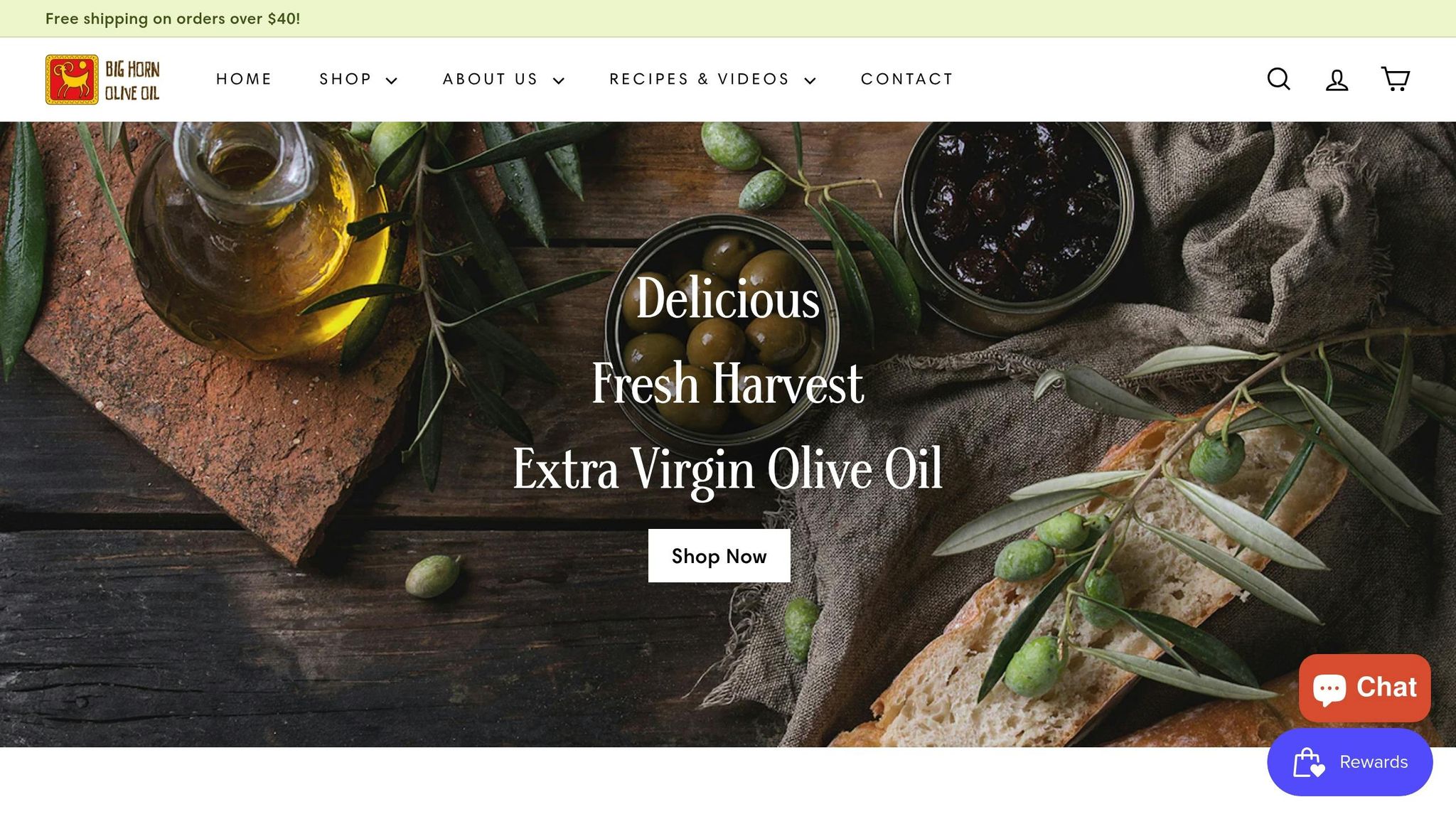Blockchain in Olive Oil Traceability
Blockchain is changing how olive oil is tracked, ensuring every step - from harvest to shelf - is accurate and transparent. Here’s how it works:
- Tracks Every Step: From GPS-tagged harvests to bottling, blockchain records it all.
- Ensures Quality: Smart contracts verify freshness and cold-press timelines.
- Empowers Consumers: QR codes on bottles show origin, quality tests, and storage details.
Why it matters: Olive oil buyers can now verify authenticity, quality, and freshness, while producers maintain high standards with real-time monitoring. This technology reduces fraud and builds trust in the olive oil supply chain.
Coricelli, the oil blockchain takes off

Blockchain Applications in Olive Oil Production
Blockchain technology is making waves in olive oil production by improving transparency and ensuring trust throughout the process.
Supply Chain Monitoring
By leveraging blockchain's ability to securely record data, every step of olive oil production can be meticulously tracked. Each batch is assigned a unique identifier that captures key details like harvest dates, processing locations, storage conditions, transportation routes, and distribution timelines. This real-time recording ensures that any irregularities are quickly identified and addressed.
Quality Control Using Smart Contracts
Smart contracts play a pivotal role in maintaining quality standards. These digital agreements combine lab test results and sensor data to confirm that production parameters are met. Once the criteria are satisfied, a digital certificate is automatically issued and stored on the blockchain. This system eliminates manual oversight and builds the trust consumers rely on.
Giving Consumers Access to Product Data
Blockchain also empowers consumers by offering full visibility into the product's journey. Each bottle features a QR code that, when scanned, provides a detailed digital history, including:
- The harvest date and location
- Information about the processing facility
- The entire journey from grove to bottle
- Quality test results and storage condition data
This level of transparency helps consumers make informed choices, ensuring that the olive oil they purchase meets rigorous standards for freshness and quality.
Big Horn Olive Oil's Blockchain System

Big Horn Olive Oil has embraced blockchain technology to ensure complete transparency and accuracy across every step of its supply chain. This approach allows for precise, real-time monitoring of quality, setting a new standard in the olive oil industry.
Cold-Press Time Verification
The blockchain system meticulously tracks the time between harvesting and pressing. Key data points include:
- Timestamps for both harvesting and pressing
- Transportation duration
- Temperature monitoring data
Using smart contracts, the system ensures that cold-pressing happens within two hours of harvesting. If this window is exceeded, the system automatically triggers alerts, maintaining strict quality control.
Modena Balsamic Origin Verification
Big Horn Olive Oil extends its blockchain protocols to its balsamic vinegars, maintaining the same level of precision. The system records:
- Vineyard GPS coordinates in Modena
- DOP certification documents
- Aging documentation and conditions
- Transportation records
Each barrel is assigned a digital passport, guaranteeing its authenticity and proper aging process.
Live Product Data Access
To enhance transparency, Big Horn Olive Oil offers consumers real-time access to detailed product information. By scanning a QR code on each bottle, customers can view:
- Harvest and pressing timestamps
- Origin verification
- Third-party quality certifications
- Compliance with Ultra Premium standards
- Storage conditions
- Temperature logs
Smart contracts validate all data entries on the blockchain, ensuring accuracy for both consumers and supply chain partners. This system not only builds trust but also provides a deeper connection between customers and the product's journey.
sbb-itb-4066b8e
Technical Hurdles and Solutions
Implementing blockchain technology for olive oil traceability comes with its fair share of technical challenges, but there are practical solutions to tackle them.
Data Storage Solutions
The olive oil supply chain generates a massive amount of data - everything from production details to transportation records - that must be stored securely and efficiently. Traditional blockchain networks often face limitations when it comes to handling large-scale data directly on-chain. To overcome this, several strategies are being explored:
- Distributed IPFS Storage: The InterPlanetary File System (IPFS) provides a decentralized way to store documents like quality certificates and compliance logs.
- Smart Data Compression: Advanced algorithms are used to compress data without losing essential details, making storage more efficient.
- Hybrid Storage Systems: By combining on-chain and off-chain storage, companies can strike a balance between security, performance, and cost.
These solutions enable the supply chain to manage data effectively while maintaining security and accessibility.
Supply Chain Partner Integration
Once data storage is addressed, the next hurdle is integrating supply chain partners. This requires uniform standards and seamless data exchange. Key challenges include:
- Developing APIs for smooth data sharing
- Standardizing data formats across various systems
- Ensuring compatibility between different software platforms and maintaining reliable network connections
The integration process typically involves three key steps:
- Initial Assessment: Reviewing existing systems to identify necessary upgrades in hardware, software, and network infrastructure.
- Standardization Protocol: Establishing consistent data formats and communication protocols to ensure smooth data flow across all partners.
- Training and Support: Providing comprehensive training for everyone involved, from field workers to management, to ensure accurate and efficient data handling.
User-Friendly Data Access
Even with backend systems in place, making blockchain data accessible to all users is crucial. Simplified interfaces and mobile applications play a key role in this. These tools often include:
- QR Code Scanning: Instantly verify product details and certifications.
- Visual Supply Chain Tracking: Easily follow a product's journey through the supply chain.
- Real-Time Updates: Get live information on the status of products.
Next Steps in Blockchain Traceability
Blockchain is taking olive oil authenticity to the next level by integrating NFTs as unchangeable digital certificates.
By building on previous advancements, NFT verification enhances transparency, giving consumers deeper insights into the products they purchase.
NFT Product Verification
NFTs are becoming a powerful tool for verifying the authenticity of premium olive oils. Each NFT contains detailed information about a bottle's origin, production process, and quality certifications.
Here’s how NFTs add value:
- Unique identification: Each bottle is assigned a one-of-a-kind digital identity.
- Complete traceability: NFTs record every step of production, from harvest to bottling.
- Consumer engagement: Shoppers can access NFT metadata to discover the story behind their olive oil.
For ultra-premium olive oils, the NFT metadata includes:
| NFT Data Point | Verification Details |
|---|---|
| Origin Certification | Harvest location and date |
| Production Process | Milling, bottling, and quality checks |
| Quality Certifications | Documentation of quality assessments |
Summary
Blockchain is revolutionizing the way olive oil traceability is handled, creating a tamper-proof record that follows the product from harvest to table. This ensures that ultra-premium quality is verified every step of the way.
Here are three major ways blockchain has improved olive oil authentication:
Better Quality Assurance
Blockchain keeps track of crucial quality details, like harvest dates, to ensure the product meets high standards.
Transparent Supply Chain
Every stage of the olive oil's journey is recorded on an unchangeable ledger, confirming that only the top 5% of olive harvests are used.
Empowered Consumers
With blockchain verification, consumers gain access to detailed product information, allowing them to make informed choices:
| Data Point | Consumer Benefit |
|---|---|
| Harvest Date | Guarantees a fresh product within a 9-month window |
| Origin Verification | Confirms the oil comes from genuine source regions |
| Processing Methods | Validates the use of cold-press techniques |
| Quality Certifications | Assures adherence to premium-grade standards |
Blockchain traceability is continuing to evolve. Future advancements include AI-driven quality control, monitoring environmental impacts, and even NFT-based verification, all aimed at further enhancing trust and authenticity in the olive oil industry.
FAQs
How does blockchain improve the traceability and authenticity of olive oil products?
Blockchain technology is transforming how we verify the quality and origin of olive oil, making the entire supply chain more secure and transparent. It creates a tamper-proof record of every step, from harvesting olives to bottling and distribution. This means consumers can confidently check where their olive oil comes from, how it was made, and whether it meets quality standards.
Take, for instance, the way blockchain enables producers to log crucial details like harvest dates, production methods, and quality certifications. By scanning a QR code or using other digital tools, consumers can instantly access this information, ensuring the product is genuine and meets high standards. Companies like Big Horn Olive Oil are using blockchain to reinforce their dedication to providing premium, reliable olive oil.
How do smart contracts help ensure the quality of olive oil throughout the supply chain?
Smart contracts are transforming how olive oil quality is maintained by automating and securing critical supply chain processes. These self-executing agreements, powered by blockchain technology, operate based on preset rules and conditions. They can validate essential factors like production standards, storage temperatures, and transportation schedules.
By making sure every step adheres to strict quality criteria, smart contracts deliver real-time transparency and accountability. For instance, they can automatically record temperature data during shipping or verify that olives were harvested and processed within the ideal time window. This approach not only safeguards the freshness and quality of the olive oil but also strengthens consumer confidence with an unchangeable record of its journey from grove to table.
How does blockchain technology help consumers understand the journey of their olive oil, and what benefits does it provide?
Blockchain technology is transforming the way consumers understand their olive oil's journey - right from the grove to their table. By simply scanning a QR code on the packaging, buyers gain access to verified details such as the oil's origin, production date, quality certifications, and even the exact farm where the olives were harvested.
This kind of traceability fosters trust, giving assurance that the olive oil is genuine, fresh, and responsibly produced. For those who prioritize health or seek premium options like Ultra Premium Extra Virgin Olive Oil, blockchain provides the transparency needed to make confident, well-informed choices.

